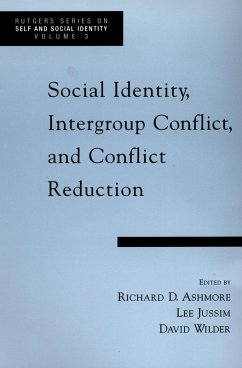
Social Psychology of Intergroup Reconciliation (eBook, PDF)
From Violent Conflict to Peaceful Co-Existence
Redaktion: Nadler, Arie; Fisher, Jeffrey D.; Malloy, Thomas
Versandkostenfrei!
Sofort per Download lieferbar
44,95 €
inkl. MwSt.
Weitere Ausgaben:

PAYBACK Punkte
22 °P sammeln!
The volume begins with an overview by Herbert Kelman discussing reconciliation as distinct from related processes of conflict settlement and conflict resolution. Following that, the first section of the volume focuses on intergroup reconciliation as consisting of moving beyond feelings of guilt and victimization (i.e., socio-emotional reconciliation). These processes include acceptance of responsibility for past wrongdoings and being forgiven in return. Such processes must occur on the background of restoring and maintaining feelings of esteem and respect for each of the parties. The chapters ...
The volume begins with an overview by Herbert Kelman discussing reconciliation as distinct from related processes of conflict settlement and conflict resolution. Following that, the first section of the volume focuses on intergroup reconciliation as consisting of moving beyond feelings of guilt and victimization (i.e., socio-emotional reconciliation). These processes include acceptance of responsibility for past wrongdoings and being forgiven in return. Such processes must occur on the background of restoring and maintaining feelings of esteem and respect for each of the parties. The chapters in the second section focus on processes through which parties learn to co-exist in a conflict free environment and trust each other (i.e., instrumental reconciliation). Such learning results from prolonged contact between adversarial groups under optimal conditions. Chapters in this section highlight the critical role of identity related processes (e.g., common identity) and power equality in this context. The contributions in the third part apply the social-psychological insights discussed previously to an analysis of real world programs to bring reconciliation (e.g., Tutsis and Hutus in Rwanda, Israelis and Palestinians, and African societies plagued by the HIV epidemic and the Western aid donors). In a concluding chapter Morton Deutsch shares his insights on intergroup reconciliation that have accumulated in close to six decades of work on conflict and its resolution.
Dieser Download kann aus rechtlichen Gründen nur mit Rechnungsadresse in A, B, BG, CY, CZ, D, DK, EW, E, FIN, F, GR, HR, H, IRL, I, LT, L, LR, M, NL, PL, P, R, S, SLO, SK ausgeliefert werden.













